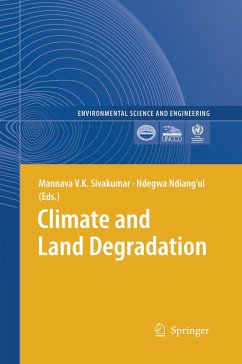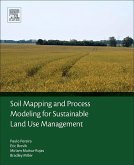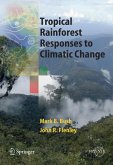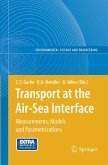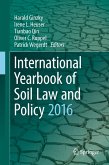Mannava V.K. Sivakumar (Volume ed.) / Ndegwa Ndiang'ui
Climate and Land Degradation
Herausgegeben:Sivakumar, Mannava V. K.; Ndiang'ui, Ndegwa
Mannava V.K. Sivakumar (Volume ed.) / Ndegwa Ndiang'ui
Climate and Land Degradation
Herausgegeben:Sivakumar, Mannava V. K.; Ndiang'ui, Ndegwa
- Gebundenes Buch
- Merkliste
- Auf die Merkliste
- Bewerten Bewerten
- Teilen
- Produkt teilen
- Produkterinnerung
- Produkterinnerung
In many parts of the world, climatic variations are recognized as one of the major factors contributing to land degradation impacting on agricultural systems performance and management. To accurately assess sustainable land management practices, the climate resources and the risk of climate-related or induced natural disasters in a region must be known. Only when climate resources are paired with management or development practices can the land degradation potential be assessed and appropriate mitigation technologies be developed. This book is based on an International Workshop held in Arusha,…mehr
Andere Kunden interessierten sich auch für
![Soil Mapping and Process Modeling for Sustainable Land Use Management Soil Mapping and Process Modeling for Sustainable Land Use Management]() Paulo PereiraSoil Mapping and Process Modeling for Sustainable Land Use Management83,99 €
Paulo PereiraSoil Mapping and Process Modeling for Sustainable Land Use Management83,99 €![Land Degradation and Desertification: Assessment, Mitigation and Remediation Land Degradation and Desertification: Assessment, Mitigation and Remediation]() Land Degradation and Desertification: Assessment, Mitigation and Remediation113,99 €
Land Degradation and Desertification: Assessment, Mitigation and Remediation113,99 €![Tropical Rainforest Responses to Climatic Change Tropical Rainforest Responses to Climatic Change]() John FlenleyTropical Rainforest Responses to Climatic Change130,99 €
John FlenleyTropical Rainforest Responses to Climatic Change130,99 €![Transport at the Air-Sea Interface Transport at the Air-Sea Interface]() Transport at the Air-Sea Interface112,99 €
Transport at the Air-Sea Interface112,99 €![Microbial Degradation of Xenobiotics Microbial Degradation of Xenobiotics]() Microbial Degradation of Xenobiotics112,99 €
Microbial Degradation of Xenobiotics112,99 €![Floods and Landslides: Integrated Risk Assessment Floods and Landslides: Integrated Risk Assessment]() Floods and Landslides: Integrated Risk Assessment38,99 €
Floods and Landslides: Integrated Risk Assessment38,99 €![International Yearbook of Soil Law and Policy 2016 International Yearbook of Soil Law and Policy 2016]() International Yearbook of Soil Law and Policy 201675,99 €
International Yearbook of Soil Law and Policy 201675,99 €-
-
-
In many parts of the world, climatic variations are recognized as one of the major factors contributing to land degradation impacting on agricultural systems performance and management. To accurately assess sustainable land management practices, the climate resources and the risk of climate-related or induced natural disasters in a region must be known. Only when climate resources are paired with management or development practices can the land degradation potential be assessed and appropriate mitigation technologies be developed. This book is based on an International Workshop held in Arusha, Tanzania and should be of interest to all organizations and agencies interested in sustainable land management to arrest land degradation.
Produktdetails
- Produktdetails
- Environmental Science and Engineering
- Verlag: Springer / Springer Berlin Heidelberg / Springer, Berlin
- Artikelnr. des Verlages: 12058495, 978-3-540-72437-7
- 2007
- Seitenzahl: 652
- Erscheinungstermin: 28. August 2007
- Englisch
- Abmessung: 241mm x 160mm x 41mm
- Gewicht: 1076g
- ISBN-13: 9783540724377
- ISBN-10: 3540724370
- Artikelnr.: 22917024
- Herstellerkennzeichnung
- Springer-Verlag GmbH
- Tiergartenstr. 17
- 69121 Heidelberg
- ProductSafety@springernature.com
- Environmental Science and Engineering
- Verlag: Springer / Springer Berlin Heidelberg / Springer, Berlin
- Artikelnr. des Verlages: 12058495, 978-3-540-72437-7
- 2007
- Seitenzahl: 652
- Erscheinungstermin: 28. August 2007
- Englisch
- Abmessung: 241mm x 160mm x 41mm
- Gewicht: 1076g
- ISBN-13: 9783540724377
- ISBN-10: 3540724370
- Artikelnr.: 22917024
- Herstellerkennzeichnung
- Springer-Verlag GmbH
- Tiergartenstr. 17
- 69121 Heidelberg
- ProductSafety@springernature.com
Mannava V.K. Sivakumar, World Meteorological Organization, Geneva, Switzerland / Ndegwa Ndiang'ui, United Nations Convention to Combat Desertification, Bonn, Germany
The Assessment of Global Trends in Land Degradation.- Status and Trends in Land Degradation in Africa.- Status and Trends in Land Degradation in Asia.- Trends in Land Degradation in Latin America and the Caribbean, the Role of Climate Change.- Trends in Land Degradation in Europe.- Climate and Land Degradation - an Overview.- Climate, Extreme Events and Land Degradation.- Effects of Some Meteorological Parameters on Land Degradation in Tanzania.- Rainfall and Land Degradation.- Frequency of Wet and Dry Spells in Tanzania.- Climate Variability, Climate Change and Land Degradation.- Fire Weather and Land Degradation.- Importance of Drought Information in Monitoring and Assessing Land Degradation.- The Role of Land Degradation in the Agriculture and Environment Nexus.- Using Weather and Climate Information for Landslide Prevention and Mitigation.- Drought Hazard and Land Management in the Drylands of Southern Africa.- Climate Monitoring in the Southern Africa Development Community.- Carbon Sequestration and Land Degradation.- Sustainable Land Management Through Soil Organic Carbon Management and Sequestration - The GEFSOC Modelling System.- Seasonal Variation of Carbon Dioxide, Rainfall, NDVI and it's Association to Land Degradation in Tanzania.- Land Degradation Control in Northern Africa.- Challenges and Trade-Offs in Environmental and Financial Approaches of the Afforestation of Degraded Lands.- The EU-Funded Medcoastland Thematic Network and its Findings in Combating Land Degradation in the Mediterranean Region.- Managing Land Use, Protecting Land and Mitigating Land Degradation: Tanzania Case Study.- Implementation of Initiatives for Addressing Climate Change and Land Degradation: A Look at the Philippine Context.- Successful Grassland Regeneration in a SeverelyDegraded Catchment: a Whole of Government Approach in North West Australia.- Land Degradation Management in Southern Africa.- Successful Experiences of Sustainable Land Use in Hyperarid, Arid and Semiarid Zones from Peru.- Role of Organic Agriculture in Preventing and Reversing Land Degradation.- Using Better Climate Prediction in the Implementation of National Action Programmes - (Eastern) Europe.- Improving NAP Implementation through Effective Use of Early Warning: Experiences in the IGAD Sub-Region.- Role of Drought Monitoring and Management in NAP Implementation.- Climate and National Action Programs in Latin America.- Conclusions and Recommendations.- Workshop Statement.
The Assessment of Global Trends in Land Degradation.- Status and Trends in Land Degradation in Africa.- Status and Trends in Land Degradation in Asia.- Trends in Land Degradation in Latin America and the Caribbean, the Role of Climate Change.- Trends in Land Degradation in Europe.- Climate and Land Degradation - an Overview.- Climate, Extreme Events and Land Degradation.- Effects of Some Meteorological Parameters on Land Degradation in Tanzania.- Rainfall and Land Degradation.- Frequency of Wet and Dry Spells in Tanzania.- Climate Variability, Climate Change and Land Degradation.- Fire Weather and Land Degradation.- Importance of Drought Information in Monitoring and Assessing Land Degradation.- The Role of Land Degradation in the Agriculture and Environment Nexus.- Using Weather and Climate Information for Landslide Prevention and Mitigation.- Drought Hazard and Land Management in the Drylands of Southern Africa.- Climate Monitoring in the Southern Africa Development Community.- Carbon Sequestration and Land Degradation.- Sustainable Land Management Through Soil Organic Carbon Management and Sequestration - The GEFSOC Modelling System.- Seasonal Variation of Carbon Dioxide, Rainfall, NDVI and it's Association to Land Degradation in Tanzania.- Land Degradation Control in Northern Africa.- Challenges and Trade-Offs in Environmental and Financial Approaches of the Afforestation of Degraded Lands.- The EU-Funded Medcoastland Thematic Network and its Findings in Combating Land Degradation in the Mediterranean Region.- Managing Land Use, Protecting Land and Mitigating Land Degradation: Tanzania Case Study.- Implementation of Initiatives for Addressing Climate Change and Land Degradation: A Look at the Philippine Context.- Successful Grassland Regeneration in a SeverelyDegraded Catchment: a Whole of Government Approach in North West Australia.- Land Degradation Management in Southern Africa.- Successful Experiences of Sustainable Land Use in Hyperarid, Arid and Semiarid Zones from Peru.- Role of Organic Agriculture in Preventing and Reversing Land Degradation.- Using Better Climate Prediction in the Implementation of National Action Programmes - (Eastern) Europe.- Improving NAP Implementation through Effective Use of Early Warning: Experiences in the IGAD Sub-Region.- Role of Drought Monitoring and Management in NAP Implementation.- Climate and National Action Programs in Latin America.- Conclusions and Recommendations.- Workshop Statement.

